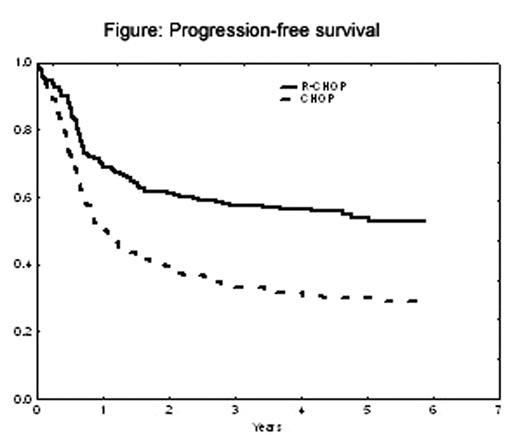Abstract
In 1998, the GELA (Groupe d’Etude des Lymphomes de l’Adulte) ran a randomized study to evaluate the benefit of the addition of rituximab to CHOP chemotherapy in elderly patients (60 to 80 years old) with diffuse large B-cell lymphoma. Early results were presented at ASH 2000 and published in
Table 1. 5-year survivals
| . | R-CHOP . | CHOP . | P value . |
|---|---|---|---|
| Median event-free survival | 3.8 y | 1.1 y | =0.00002 |
| 5-year event-free survival | 47% | 29% | |
| Median progression-free survival | Not reached | 1 y | <0.00001 |
| 5-year progression-free survival | 54% | 30% | |
| Median overall survival | Not reached | 3.1 y | =0.0073 |
| 5-year overall survival | 58% | 45% |
| . | R-CHOP . | CHOP . | P value . |
|---|---|---|---|
| Median event-free survival | 3.8 y | 1.1 y | =0.00002 |
| 5-year event-free survival | 47% | 29% | |
| Median progression-free survival | Not reached | 1 y | <0.00001 |
| 5-year progression-free survival | 54% | 30% | |
| Median overall survival | Not reached | 3.1 y | =0.0073 |
| 5-year overall survival | 58% | 45% |
Progression-free survival is shown in the figure; PFS does not included 19 patients who died in CR from causes not related to lymphoma or its treatment, 5 in CHOP arm and 14 in R-CHOP arm. It better reflects the long term effect of treatment on the disease. No severe late toxicity was observed in R-CHOP treated patients and deaths not related to lymphoma did not show any pattern.
In conclusion, long term results continue to show a major benefit for the addition of rituximab to CHOP in the treatment of patients with DLBCL. This improvement increases with time.
Author notes
Corresponding author


